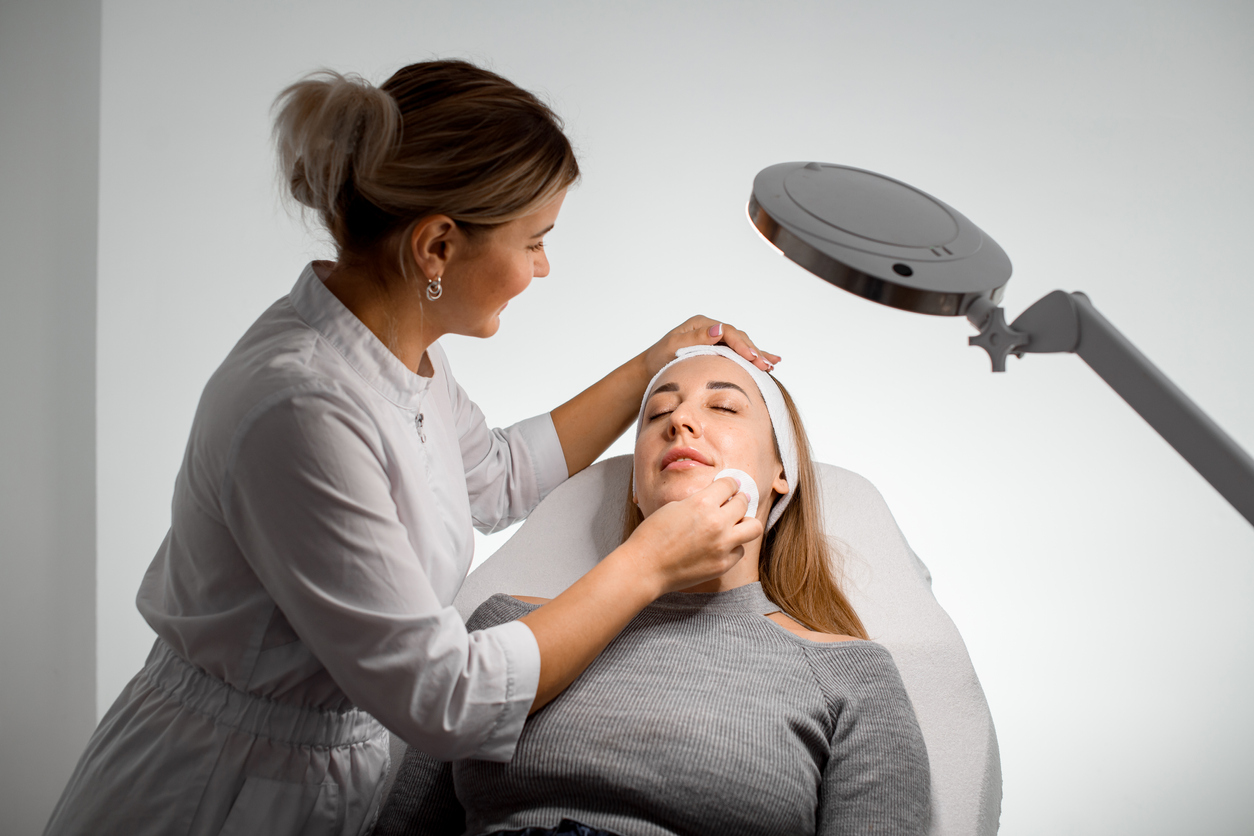With summer in full swing QED skincare founder and salon owner Shoshana Eisner discusses how skin therapists can help alert clients to potentially dangerous skin cancers.
A few months ago, Judy*, one of our gorgeous 70-something-young customers arrived for her monthly 60-minute Facial. It is not a coincidence that our facials are named the QED Customised Facial. Even with our regulars, we begin every treatment with a consult about any skin changes. The Facial then begins with a deep cleanse to make your skin super-clean and then our therapist examines your skin with a Magnifying Lamp to determine exactly what your skin needs. Only then is the plan for the Facial determined.
Skin changes
When asked about skin changes, Judy mentioned that she might need to change from her regular QED Cleanser as it had started stinging. When her therapist asked if the cleanser stung all over her face. Judy replied that it was only a problem in one area of her cheek, just below her cheekbone. This was a red flag to our experienced Beauty Therapist, Gina.
When Gina examined Judy’s freshly-cleansed skin with a Magnifying Lamp. she could see that the patch of skin looked unusual, so she called me in for a second opinion. We both agreed that Judy should get her skin looked at ASAP.
Judy booked in to see her GP, who diagnosed this almost invisible mark as an early skin cancer. Because it was found early, it could be treated easily at home with a prescription medicine cream. Due to early diagnosis and treatment, Judy’s skin cancer is gone and she doesn’t even have a scar. And she thinks her Beauty Therapist is the best person on the planet.
According to the Cancer Council, you should go get a full-body Skin Cancer check every 12 months from a Dermatologist or even a GP that specialises in Skin Cancer checks. But who does that? The Cancer Council also strongly recommends self-checking your skin once a month and getting an urgent doctor’s appointment if you notice any changes.
Can all of your clients answer a definite YES to all of these questions?
- Do you remember to self-check your skin every month?
- Unlike Judy who couldn’t see the area behind her fabulous cheekbones, can you angle yourself to see your entire face, including your neck and behind your ears?
- Can you see every tiny detail of your face?
- Do you live with someone who will check your skin thoroughly every month?
If your clients can’t say yes to all of these, they should consider getting a monthly facial with you, a therapist they trust. But you need to tell them that you are having a look.
As a skincare professional, you should be having a critical look at your client’s clean skin at every treatment with a magnifying lamp. And don’t be afraid to tell your client if you see anything strange. And if you spot something unusual, encourage your client to book an appointment with their GP to get it checked out. It might be nothing, or it might be something that early intervention may help with.
How facials can be used in the fight against skin cancer
By examining the skin with a magnifying lamp during a facial, experienced Beauty Therapists can notice suspicious skin changes that may be early signs of skin cancer. This early detection can lead to prompt medical intervention, increasing the chances of successful treatment and recovery. So, next time you book a facial appointment, you may be pampering yourself and taking a proactive step towards your health.
The importance of early detection of skin cancers
Early detection is crucial when it comes to skin cancers. Unlike other types of cancers, skin cancers are usually visible on the skin’s surface, making them more accessible for early identification and treatment.
A Beauty Therapist examination does not replace the examination of a Doctor. The most reliable methods for detecting skin cancer are through medical screenings performed by trained healthcare professionals, such as GPs who specialise in Skin checks or dermatologists. These screenings typically involve visual examination, dermoscopy (a technique that uses a magnifying instrument), and, if necessary, biopsy for further analysis.
A year between skin checks can be a long time in our sunburnt country, so it is strongly recommended that customer self-check their skin once a month. Any changes in your skin, I strongly recommend scheduling an appointment with a dermatologist or GP for a proper evaluation and diagnosis. It’s crucial to rely on medical professionals and established diagnostic procedures to detect skin cancer.
How facials can detect skin cancers?
Facials can play a vital role in detecting skin cancers due to the thorough examination of the skin that takes place during the treatment. A great Beauty Therapist is trained to differentiate between healthy and unhealthy skin. By closely inspecting the skin, they may detect changes in moles or lesions, such as irregular shape, uneven borders, or colour changes.
A good Beauty Therapist who notices any concerning signs will recommend that the client seeks further evaluation from a dermatologist or healthcare professional. This prompt referral can lead to timely treatment and potentially save lives.
The signs and symptoms of skin cancers
Skin cancers can present in different ways, and awareness of the signs and symptoms is crucial for early detection. The most common types of skin cancer include basal cell carcinoma (BCC), squamous cell carcinoma (SCC), and melanoma. Each type has its own distinct characteristics.
BCC often appears as a pearly or waxy bump on the skin, which may bleed or develop a crust. It can also resemble a pinkish patch of skin that is slightly elevated. SCC may manifest as a scaly, red patch or an open sore that does not heal. It can also resemble a raised growth with a central depression. Melanoma, the most dangerous type of skin cancer, often presents as an irregularly shaped mole that may have uneven borders, varied colours, and changes in size.
Regular self-examination of the skin is essential to spot any unusual changes. If you notice any concerning signs, it is critical that your client seeks professional medical advice promptly.
Benefits of using facials for skin cancer detection
Using facials for skin cancer detection offers several benefits. Firstly, it provides an additional layer of screening beyond self-examinations. While self-examinations are crucial, they can sometimes miss subtle changes or abnormalities. The trained eye (and magnifying lamp) of a Beauty Therapist can pick up on these subtle signs and prompt further evaluation.
Facials also offer a relaxing and pampering experience, which can encourage individuals to prioritise their skin health. Regular facial appointments serve as a reminder to pay attention to any changes in the skin and seek professional advice if needed. Combining the benefits of relaxation and skin health, facials provide a holistic approach to skincare.

This article was contributed by Shoshana Eisner, founder at QED Skincare.
This article originally appeared in the Summer 2024 print issue of Professional Beauty.
Read the current issue of our digital magazine here:
- For more news and updates, subscribe to our weekly newsletter
- Follow us on Instagram
- Like us on Facebook
- Join Australia’s largest network of beauty industry professionals on LinkedIn
- Subscribe to our print magazine
Have an idea for a story or want to see a topic covered on our site and in our pages? Get in touch at info@professionalbeauty.com.au.

